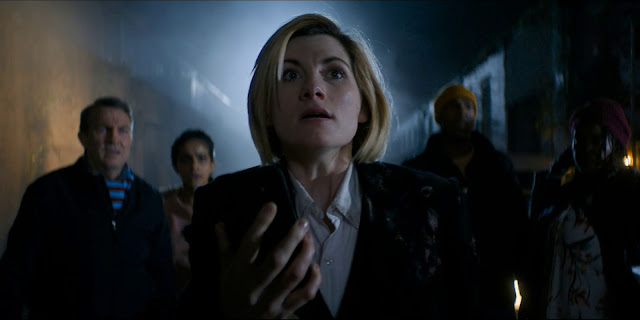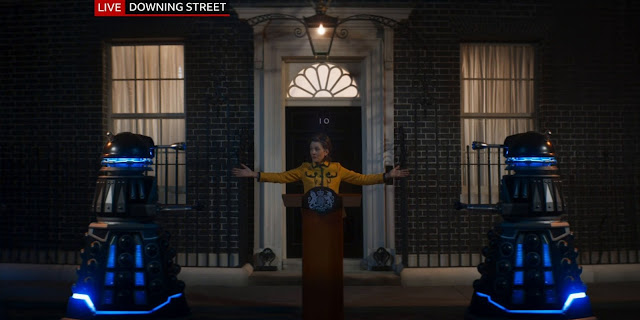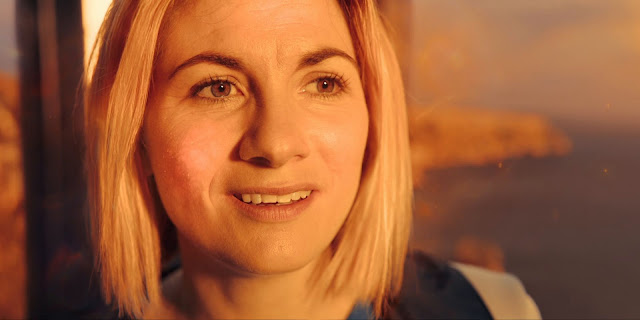 |
| The Thirteenth Doctor (Jodie Whittaker), with "The Fam." |
I'm writing this just shy of two years from the end of the Thirteenth Doctor's era, just as I'm preparing to move on to viewing and reviewing Ncuti Gatwa's first season as the 15th Doctor. Before I move forward, I'm feeling a need to look back, because many of my thoughts about the tenure of showrunner Chris Chibnall and star Jodie Whittaker are not fully represented by my reviews of the individual episodes.
Fair warning: This is neither a hate post nor a love letter. If you're looking for relentless negativity, I suggest finding a YouTube video, probably one with googly eyes on the thumbnail that uses the word "woke" a lot. If you're looking for only positive comments, then do the same, only avoiding those particular search cues. I'm going to discuss both what worked for me (and a lot did) and my frustrations about elements that either didn't work or that I thought fell short of their potential.
As ever, this represents my own opinion, and other views are available.
 |
| The Doctor confronts a Cyberman - and Whittaker shines with a script that lets her get properly angry for a change. |
JODIE WHITTAKER AS THE DOCTOR:
The announcement of Jodie Whittaker's casting came during my burnout period, in which I was neither viewing nor reviewing Doctor Who or anything else. I will admit that the announcement caught my eye. Whittaker is an actress whose work I've generally enjoyed, and I found her to be particularly good in Chris Chibnall's Broadchurch. It took me another year to recover from my malaise, but her casting was one of the reasons I decided to return to Who when I was ready to start reviewing again.
My response to her first appearance was... well, mixed. She was fine in The Woman Who Fell to Earth, with excellent individual moments... but she also had several deliveries that struck me as either flat or just plain misjudged. It wasn't until Rosa that she won me over. Even then, Arachnids in the UK (in my opinion, her single worst performance in the role) made me doubtful all over again.
Her performance improves whenever a script avoids reducing her to "the nice Doctor." There are glimpses throughout Series 11: Her scenes with Krasko in Rosa, her interactions with both the Thijarians and Manish in Demons of the Punjab, her confrontation with King James in The Witchfinders, and her general grumpiness in Kerblam! All of these moments saw Whittaker's performance noticeably improve.
Thankfully, that became explicit characterization in Series 12 and 13, as it became clear that this Doctor's friendly smile was a shield to protect her from getting too close to her companions. She may have labeled her first companion set "Fam," but she kept them at a distance, avoiding anything that resembled a meaningful personal question. If they pushed harder, as Yaz often did in Series 13, she became snappish and even hostile. The more these beats were played, the better both character and actor became.
Whittaker was excellent at showing the character's defensiveness, and I think she exceled in moments of frustration and anger. On the other hand, I don't think she ever quite got the handle of delivering sci-fi Technobabble. In her first season, her Technobabble scenes often reminded me of actors phonetically reciting foreign language dialogue. She got better (and the scripts wrote less of it for her), but it remained a weakness.
Her worst performances came whenever she was written as "Dr. Exposition." Her acting flattened in episodes like Praxeus, Revolution of the Daleks, and Survivors of the Flux, in which she was little more than a vessel for explanations. I got the impression she couldn't engage with reams of exposition, and I wasn't surprised when excessive exposition was one of the only complaints she voiced in interviews after her exit.
 |
| The Doctor officiates a wedding in Demons of the Punjab, easily my favorite episode of this era. |
WHAT WORKS:
When the Chibnall era gets discussed, particularly after a couple years' distance, I see a lot of the sentiment: "Jodie was good, shame about the scripts." There is truth to that, but I think it's reductive.
There are a handful of fine scripts in these three-and-a-bit seasons. The stories from Vinay Patel and Maxine Alderton would stack up well in any era, and I hope both writers get a chance to submit for the series in the future. Chibnall's own stories include a solid new Doctor introduction in The Woman Who Fell to Earth; a terrific time-loop story in Eve of the Daleks; and, in War of the Sontarans, the best showing for the potato-headed warriors since their introduction during Jon Pertwee's tenure... though, as my review noted at the time, that doesn't clear the highest of bars; my pick for their previous second best story was the enjoyable but heavily flawed The Two Doctors.
In my Series Eleven overview, I stated some of my issues with that first season. Still, while I had quibbles with the execution, Series Eleven's attempt at a grounded and character-focused approach was something I had wanted to see from Doctor Who for a while. When the Doctor introduced herself as "just a traveler" who helps where she can, I wanted to applaud. I also love that all of Thirteen's companions are ordinary people - no dark secrets, no paradoxes, no alien plots. Just a group of average but highly decent human beings.
 |
| Revolution of the Daleks. Like a lot of episodes, it's fine. Just... fine. |
A LITTLE TOO CONSISTENT:
Chris Chibnall wrote a higher proportion of the scripts than his predecessors did, which results in an era that's very consistent in tone and quality. There are relatively few episodes that I think are truly bad. Even the worst don't approach the awfulness of other eras' stinkers. Gun to my head, I would choose to rewatch both Orphan 55 and Legend of the Sea Devils before I sat through either Victory of the Daleks or Fear Her again.
The flipside of this is that there are equally few standouts. The only "10/10" I awarded across three seasons was for Demons of the Punjab, while there are individual RTD and Moffat seasons that feature multiple episodes that I gave full marks. Most of the shows range from "okay" to "pretty good." That doesn't sound bad on the face of it, but a steady diet of "pretty good" becomes numbing in practice.
By the time Flux rolled around, I no longer felt excitement at the prospect of a new season. Ironically, and despite its flaws, that ended up becoming my favorite Chibnall season. But I came away from the era reflecting that the occasional ghastly dud was something I was willing to put up with, if it also meant that something truly brilliant might be around the corner.
 |
| Graham (Bradley Walsh) and Ryan (Tosin Cole) get Series 11's character arc, leaving the Doctor and Yaz to just carry the plots. |
CHARACTERS:
Up to this point, most of my thoughts tilt toward the positive, albeit with a side of, "This could have been better." Shifting to the regular characters, however, moves into an area that left me feeling frustrated.
I liked all three of the initial companions. As of Rosa, I thought this was a promising new set of regulars, just waiting for scripts that would bring out extra layers that would make them "pop." Sadly, at least for me, that "pop" never happened.
Some of the reasons are easy enough to determine. There's a lack of interaction, particularly among the "Fam" of Series Eleven and Twelve. Too many episodes fall into a familiar pattern of splitting them into teams - usually with the Doctor and Yaz working on the plot while Graham and Ryan received moments of character (in Series Eleven) or comedy relief (in Series Twelve).
The results tended to be good whenever an episode broke away from that pattern. Ryan and Yaz get some well-written exchanges in The Woman Who Fell to Earth and Rosa. Yaz and Graham share terrific moments in Demons of the Punjab and Ascension of the Cybermen. But Yaz is the only companion who gets significant one-on-one time with the Doctor. Even before the "Fam" leaves, it feels as if Yaz is her actual companion, with the other two just along for the ride.
Yaz also doesn't come properly into focus until Graham and Ryan leave. In those first two seasons, it often feels as if she's competing against them for screen time... and even in her supposed "spotlight" episodes, it tends to feel like she's losing that competition.
This improves with Flux and the specials, which see her interacting with new companion Dan in a way that feels a lot more authentic. It further helps that this shift happens at the same time that she starts really pushing back against the Doctor's secretiveness. At this point, the character starts to work... but by the time Flux starts, there are less than ten episodes remaining in her tenure.
 |
| Yaz falls hard for the Doctor, and it doesn't seem entirely unrequited. It also doesn't go anywhere. |
BOLD IDEAS, TIMID EXECUTION:
And on to my single biggest frustration.
On paper, Chris Chibnall's ideas for Doctor Who are ambitious. These three seasons deliver: the series' first female Doctor; a massive retcon of the Doctor's origins; and the first same-sex romantic attachment between a Doctor and a companion. You can like or dislike any of these, but the ideas are unquestionably bold.
So why does it all feel so damn timid?
The first female Doctor spends too much of her first season being characterized as a blandly inoffensive "Doctor Fluffy." The Doctor, in all incarnations, has always been arrogant, more than a little judgmental, and often downright rude. In Series Eleven, she's rarely allowed to show any of these traits. She's so busy being "the nice Doctor" (right down to checking during a confrontation with a Dalek that she's nice, right?) that she too often doesn't feel properly like the Doctor.
As with other problems, this improves in her later seasons, as it becomes a major point that her surface niceness is a shield that keeps others at a distance far more effectively than the 12th Doctor's surface grumpiness ever did. But even then, she's rarely allowed to show the arrogance that the Doctor should possess.
The Doctor/Yaz relationship never actually comes to much. Yaz refers to the Doctor as "my person" in The Haunting of Villa Diodati, and her feelings for the Doctor are a character point in Flux and the first two 2022 specials... only for that to be cut off at the end of Legend of the Sea Devils when the Doctor tells her that relationships with short-lived humans end up hurting too much, something Yaz just... accepts.
Now, I've never been fond of the New Series phenomenon of Doctor/Companion romances, because they by definition can only go so far. Still, if you're going to go down that or any route, then do it! I don't think queerbaiting was the intent - but the refusal to commit to this as a direction made it come across that way. Either do a thing or don't; just half doing it will be enough to annoy those who don't like the direction while failing to satisfy those who do like it.
More than any other single element, this era's bizarre tentativeness is what holds it back. Chibnall seems to have conceived a fearless vision of Doctor Who - but instead of diving into the deep end, he keeps dipping a toe over and over before deciding the water's too cold, drying his feet off, and going back inside. Doubly frustrating for me was that I started watching this era on the heels of Broadchurch, a show from the same writer, showrunner, and actress that was emotionally fearless. His Doctor Who badly needed that same quality.
 |
| The Thirteenth Doctor's last sunrise. |
OVERALL:
Given how critical the latter half of this post has been, I feel that I should emphasize that I enjoyed the 13th Doctor era on its own terms. I liked Jodie Whittaker's Doctor, particularly when she was allowed to be a little spiky and snappish later on. I loved seeing some historically based stories that were actually centered around history. I'm a Hartnell fan, and I can easily mentally transplant the original TARDIS team into stories like Demons of the Punjab and Nikola Tesla's Night of Terror.
Still, despite liking a lot more of the individual episodes than not, this is the most frustrated I've ever felt with an era of Doctor Who, including a couple that I think are qualitatively worse than this. What I said about Whittaker in Series Eleven equally applies to the era as a whole: I think there's a genuinely great take in here, if it had only been willing to commit to its own ideas.
It's been announced that Jodie Whittaker and Mandip Gill have joined Big Finish, so maybe some of their upcoming audios will redress this. Certainly, thanks in large part to COVID sending Whittaker's final season into disarray, there's a sense of an era that's only half-finished, so this was an extremely welcome announcement for me.
At its best, Big Finish has made some great Doctor Who. Fingers crossed for that, and for something of substance to be done with the 13th Doctor and Yaz, rather than them just battling Rutans and Krynoids to fill monthly slots.
Review Index
To receive new review updates, follow me:
On BlueSky:
On Threads:










